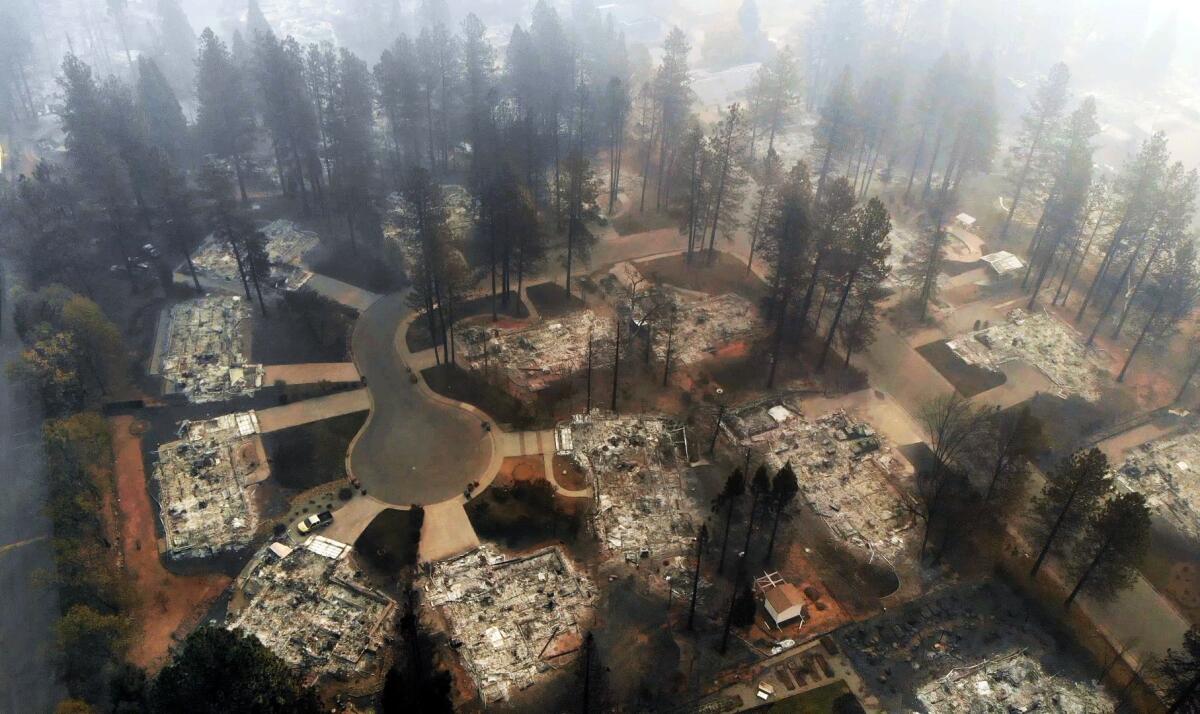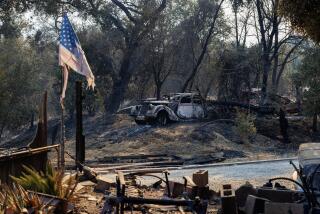Editorial: An insurance fix for fire-prone areas that only an insurance company could love

Homeowners in fire-prone areas of California have had it rough in recent years. Not only have they been threatened by gigantic, climate-change-fueled wildfires, but their insurance premiums have skyrocketed — if they haven’t been dumped by insurers worried about huge claims from the blazes that will inevitably come.
Over the course of four particularly bad fire years, from 2015 to 2018, more than 340,000 homeowners in rural areas were told by insurers their policies would not be renewed, according to the California Department of Insurance. Those unable to find another insurance company willing to write a new policy have been left with the high-cost option of last resort, the California FAIR plan.
It’s a bad situation — and it could get even worse if lawmakers approve Assembly Bill 2167, a legislative “fix” championed by the insurance industry that purports to improve coverage in areas of high fire risk. But the only thing that’s likely to improve under these proposed changes is the bottom line of insurance companies, say California’s Insurance Commissioner Ricardo Lara and consumer advocates, including the author of Proposition 103, the landmark consumer protection law regulating property and casualty insurance rates in California. They believe it will weaken the commissioner’s powers to regulate under Proposition 103 and lead to higher rates by allowing more costs to be passed on to consumers while not guaranteeing coverage.
Those warnings are enough to give us pause about a bill moving forward anytime, let alone during a pandemic-truncated legislative session at which hundreds of bills have been put on hold. Yet astonishingly, legislators are moving along this complicated proposal and its companion bill, SB 292, with little discussion or debate. Indeed, the Senate Committee on Insurance analysis of the bill is 22 pages long, but the committee allowed opponents just four minutes to explain their concerns before voting in favor. The bill is nearing its final vote, and somebody needs to stop it now before the Legislature ends hurting the very people it is supposed to help.
The insurance companies claim this is the best solution to the problem of homeowners losing coverage. But that’s doubtful. In fact, there was another, more consumer-friendly proposal, AB 2367, that was killed by the chair of the Assembly Insurance Committee, Assemblyman Tom Daly (D-Anaheim), who happens to be author of AB 2167. (One senator suggested in a hearing last week that the suppression of the alternative bill indicated something “sinister” was afoot. ) Based on a recommendation by the insurance experts on the governor’s Commission on Catastrophic Wildfire Cost and Recovery, AB 2367 would have mandated coverage to homeowners who take approved measures to lessen their fire risk, which is just the sort of incentive the state should be creating.
Besides, there’s nothing stopping insurers from requesting, and potentially receiving, rate increases right now that reflect the true risk of covering homes in fire-prone areas, provided the increases are deemed reasonable by the insurance commissioner.
We have no doubt that lawmakers sincerely want to make homeowners insurance more accessible for Californians living in high-fire risk areas nears mountains or brushy hills. Nor do we question insurers’ need for more protection from extreme losses incurred when a wildfire wipes out an entire community. But this is not the year or the way to do it.
The best course of action is for the Legislature to put AB 2167 aside until next year, when lawmakers can give it a proper vetting and consider other reasonable alternatives. Passing anything this complicated with such cursory deliberation and debate is, if you will, just playing with fire.
More to Read
A cure for the common opinion
Get thought-provoking perspectives with our weekly newsletter.
You may occasionally receive promotional content from the Los Angeles Times.










